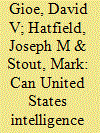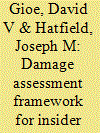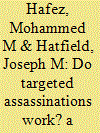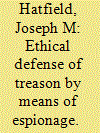| Srl | Item |
| 1 |
ID:
174214


|
|
|
|
|
| Summary/Abstract |
This article argues that United States Intelligence Community analysts can and should periodically telework as routine professional development and as a research supplement to traditional all-source intelligence analysis. We offer four key benefits to tapping into this reservoir of unclassified information that would improve the quality of the intelligence product, enable better liaison and academic exchange, and steward the profession. We conclude that an overdue rebalancing of classified and publicly available sources could be aided by telework, but only once analysts break free from ‘the cult of the SCIF’ will publicly available information receive the analytical attention that it deserves.
|
|
|
|
|
|
|
|
|
|
|
|
|
|
|
|
| 2 |
ID:
183525


|
|
|
|
|
| Summary/Abstract |
A new ‘digital generation’ of insider threat has emerged within the US intelligence community. Edward Snowden’s mass leaks were not the first transparency-driven digital challenge to the United States Intelligence Community (USIC). Three years before, then U.S. Army Private Bradley Manning provided 500,000 classified documents to WikiLeaks, which published them to great fanfare for transparency advocates while causing much concern in Washington. These are not isolated cases; the tempo of such mass public disclosures seems to be increasing. In what ways is this new breed of insider threat akin to more traditional counterintelligence breaches such as those of the Cold War? One central point of comparison is the relative damage caused by each, since it would be difficult to sustain the thesis that a new type of insidious threat has emerged if the damage caused by mass leaks was of little consequence when compared to traditional espionage cases. And ‘damage’ must be evaluated within the social history of the breaches themselves. A systematic approach to the comparison of breaches has remained elusive. This article offers such a framework using the Snowden leak as a case study in contemporary self-tasked digital breaches and the Cambridge Five spy ring as a case study in traditional externally-tasked breaches.
|
|
|
|
|
|
|
|
|
|
|
|
|
|
|
|
| 3 |
ID:
071262


|
|
|
|
|
| Publication |
2006.
|
| Summary/Abstract |
We assess the impact of Israel's targeted assassinations policy on rates of Palestinian violence from September 2000, the beginning of Al-Aqsa uprising, through June 2004. Literature concerning the relationship between repression and rebellion suggests four plausible effects of targeted assassinations on insurgents: deterrence, backlash, disruption, and incapacitation. Using differenced and lagged time-series analysis, this article utilizes multiple and logistic regression to evaluate the effect of targeted assassinations on Palestinian violence. It is concluded that targeted assassinations have no significant impact on rates of Palestinian attacks. Targeted assassinations do not decrease rates of Palestinian violence, nor do they increase them, whether in the short or long run. Targeted assassinations may be useful as a political tool to signal a state's determination to punish terrorists and placate an angry public, but there is little evidence that they actually impact the course of an insurgency.
|
|
|
|
|
|
|
|
|
|
|
|
|
|
|
|
| 4 |
ID:
151106


|
|
|
|
|
| Summary/Abstract |
This essay argues that treason by means of espionage is ethically justified when six factors are present, two of which are: that the political community being betrayed fails to secure for its citizens basic human rights and other means of peaceful or otherwise lawful protest are unavailable. The paper begins by analyzing the application of several theories of ethics to treason, including: consequentialism, deontology, the Just War tradition, and Michael Walzer’s influential concept of ‘dirty hands.’ It then criticizes these points of view and offers an account of jus ad proditione per intelligentia (just treason by means of espionage) based upon Aristotelian thinking about ethics and politics.
|
|
|
|
|
|
|
|
|
|
|
|
|
|
|
|